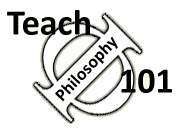Teach Philosophy 101
Free resources for
philosophy teachers!
"One of the most comprehensive, well-researched, and accessible guides for teachers that I have ever seen." James Lang, Chronicle of Higher Education (read full review of TΦ101)
Integrating Goals into Course, Syllabus, Assessment
Once you have a sense of your goals, it makes sense to integrate those goals into your syllabus at the front end of the course, to explicitly reference those goals during the course, and to assess them at the end of the semester; in other words, you should design assignments choose readings, and create in class activities with the goals in front of mind. Below you will see an example of how this was done in one intro course at Villanova University.
Stage one: Goal Setting. The goals for Villanova's Introduction to Philosophy course were set by the department, although the choice of readings, within certain parameters, is left to the instructor. The goals are listed in the left column of the matrix below.
Stage two. Inclusion in Syllabus, Dissemination to Students. This matrix, based on the departmental goals, was developed (by John Immerwahr) for a section of Introduction to Philosophy, and was included in the syllabus. Our research on student evaluations shows that Villanova students place a high value on clearly knowing the goals of their course, so, at each major transition in the course, students were reminded of these goals and progress toward them was reviewed.
Stage three: Assessment. Formal assessment of the course goals involves a graded assignment in which the student is asked to demonstrate in some fashion (through a written exam, a paper project, an in class debate, etc.) that they have met the goals of the course. Using the goals from the Villanova course, we want to assess, for example, if students do in fact have a better understanding of Catholic and Christian Philosophical ideas. The best way to assess an outcome like this is probably a written exam of some kind. Assessing a goal like "Improve your skill in reading difficult primary sources" could involve a variety of tasks: students might reconstruct an argument in their own words, giving students a challenging passage and asking them to diagram the argument in the passage, or having them work in a groups to brainstorm objections to the argument contained in a challenging text, etc. You also want to devote class time to practicing whatever skill or outcome you are going to ask students to demonstrate in the formal assessment. E.g., if you plan to ask students to diagram the argument contained in a challenging passage on a final exam, significant class time should be devoted to developing this skill.
Stage four: Student perceptions of their own progress towards achieving the course goals.
it's a good idea to get a sense of students own perceived progress towards the course goals. In the Villanova course, at the midpoint of the semester and at the end of the semester, the instructor administered this survey instrument, which was developed by the department. It's a good idea to find a way to administer course surveys like these anonymously, through the course management system or by using pencil and paper in class and asking students not to include their names.
Here is the survey used at Villanova:
For all questions please use a five point scale where: 5 = strongly agree, 1 = strongly disagree. If the question does not apply to you or to this course, just leave it blank.
This course helped me to . . .
A. improve my writing skills
B. improve my skills in reading difficult texts
C. improve skills in reasoning and thinking critically
D. improve my skills in expressing myself orally in class discussion
E. improve my understanding of philosophical questions and way of thinking
F. better understand Christian and/or Catholic ideas and perspectives
G. better understand the history of philosophy
H. better understand issues and questions in the contemporary world
I. better understand issues and questions in some of my courses outside of philosophy
Additional questions (also answer these in the Supplemental Questions Box, on five point scale where 5 = strongly agree, 1 = strongly disagree)
J. This course made me more interested in philosophy.
K. This course exposed me to the thinking of women and people of color.
M. I’m glad that I took this course.
Thank you for your participation. If you have additional comments please write them in the open ended comments box.
Slightly adapted from document produced by Villanova University Philosophy Department: 11/20/06
Update: 9/11/2025 by David Sackris
Original Author: John Immerwahr
